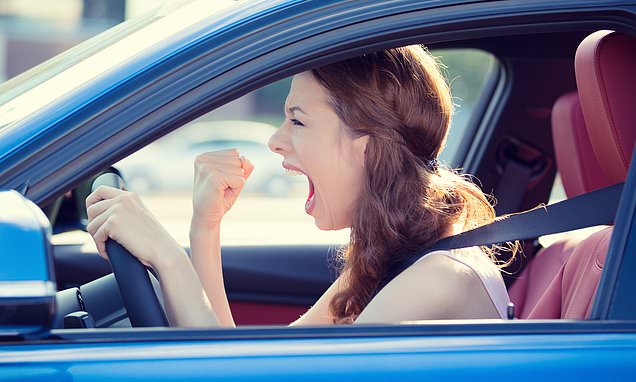
Are YOU guilty of these behaviours? Scientists reveal the key signs of aggressive drivers – after one study showed WOMEN are more likely to suffer from road rage
- Scientists have revealed the key behaviours of aggressive drivers
- These are driving 3.3 mph faster and making 2.5 times more errors
- It comes after a study found women are more likely to suffer from road rage
When someone cuts you off on the motorway, do you take a deep breath and turn up the radio, or put your foot down and get right up to their bumper?
Road rage is all too easy to slip into, but it can become a real problem when it starts to impact how people drive.
Scientists from the University of Warwick have identified some of the most common behaviours of aggressive drivers.
They say these will help self-driving vehicles spot and react appropriately to road users who may have lost their cool.
It comes after one study found that women are more likely to suffer from road rage than men.
Scientists from the University of Warwick have identified some of the most common behaviours of aggressive drivers (stock image)
Knowledge of aggressive driving behaviours will also allow those exhibiting them to recognise that they are doing so, and take steps to relax themselves.
KEY BEHAVIOURS OF AGGRESSIVE DRIVERS
According to the Metropolitan Police, four or five deaths occur on UK roads every day on average.
‘This widespread devastation is predominantly caused by dangerous and reckless drivers,’ said Detective Chief Superintendent Andy Cox.
In the past, studies have shown that road rage affects women more than men, and that females are far more likely to lose their cool behind the wheel.
The researchers suggested that women have an instinctive ‘early warning system’ which dates back to our early female ancestors who had a sense of danger for threats.
Another study found that the worst motorists drive on Tuesdays in September, between six and nine in the morning.
For their study, published in Accident Analysis and Prevention, the researchers analysed the results of 34 published studies on road rage.
They largely involved asking participants to recall an angry memory before using a driving simulator to put them in an aggressive state.
A control group of participants who were not prompted to get angry would also drive the simulator.
While both groups did so, their vehicle speed, lateral control and driving errors were recorded.
They defined a driver as aggressive when they conducted behaviours that intentionally endangered others, either psychologically, physically or both.
From these results, the researchers were able to identify the two key aggressive driving behaviours.
These were that that aggressive drivers have a 3.3 mph (5.3 kph) mean faster speed than non-aggressive drivers, and they also exhibit 2.5 times more mistakes.
Errors included not indicating when changing lanes, collisions, violation of stop signs and exceeding speed limits.
The researchers say that drivers may speed up as a way of eliminating their frustration when encountering, for example, traffic or a slow driver.
The anger they feel or express, like through shouting, may also serve as a distraction from driving and lead to more errors.
The authors say that the finding could help quantify aggressive driving behaviours, and ‘form the basis of an in-vehicle aggressive driving monitoring system’.
‘This will enable the driver to be alerted when they are at an increased risk of an accident and allow the vehicle to deploy calming methods, such as altering the cabin noise level, playing relaxing music, or ultimately reducing the speed of the vehicle,’ said Roger Woodman, Assistant Professor of Human Factors and co-author.
The findings could also assist with the development of self-driving technologies.
PhD student Zhizhuo Su, the lead author, said: ‘This research is significant because, as the era of autonomous vehicles approaches, road traffic will be a mix of both autonomous and non-autonomous vehicles, driven by people that may engaged in aggressive driving.
‘This is the first study to characterise aggressive driving behaviour quantitatively in a systematic way, which may help the autonomous vehicles identify potential aggressive driving in the surrounding environment.’
Do YOU get road rage? Scientists say sticking certain type of air freshener in your car could banish your aggression
Researchers have discovered the best air freshener for banishing your road rage — and it’s not calming lavender.
The scent of peppermint oil was found to reduce negative feelings such as stress and aggression in drivers.
This, in turn, reduces aggressive driving behaviours, according to the team from Northumbria University.
Those struggling with road rage could invest in a peppermint-scented air freshener, they suggested.
Read more here
Source: Read Full Article
